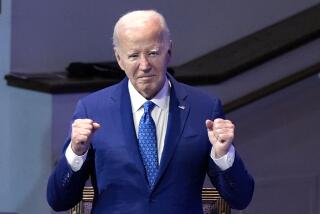Bush Gives No Ground in Visit With Democrats
- Share via
WASHINGTON — Plunging deeper than ever into hostile political territory, President Bush on Sunday addressed a closed-door meeting of House Democrats who appreciated his attention but regretted that he didn’t show any give on electoral reform, family planning and other issues that divide the parties.
House Democrats, who were holding a weekend retreat at a secluded resort in western Pennsylvania, proved Bush’s toughest audience yet in his concerted efforts to build bridges to Capitol Hill and defuse partisan tensions.
“People always feel good about his willingness to meet and tone down the rhetoric,” said Rep. Benjamin L. Cardin of Maryland. “But on specific issues, there was no real reason to feel better.”
The exchange was a reminder that the House Democratic Caucus, dominated by the party’s most liberal members, will be Bush’s biggest obstacle as he tries to enact big tax cuts, abortion limits and other building blocks of his conservative agenda.
After Bush was peppered with respectful but pointed questions, Rep. Martin Frost of Texas concluded the afternoon session by saying, “Mr. President, we didn’t promise you a rose garden.”
Despite their differences, Democrats flocked around the president afterward for 40 minutes of hand-shaking and photo-taking. The scene encapsulated the two faces of Bush’s first weeks in office: He has wowed members of Congress in both parties with his willingness to meet and listen, but he has made precious few substantive concessions to the opposition.
“He scored some points by showing up,” Frost said. “But I don’t think he got any converts. We have a long way to go in terms of substance.”
Bush’s drop-by, following similar appearances before Senate Democrats and Republicans of both chambers, came as he is preparing Thursday to send Congress a proposal that was a centerpiece of his presidential campaign: a $1.6-trillion, 10-year tax cut, which Democrats are resisting as far too big.
In a television interview Sunday, Bush’s top economic advisor said that Bush would not propose a tax cut bigger than he campaigned on, but that he supported accelerating the tax cut to put money in taxpayers’ pockets more quickly.
“The economic circumstances have changed,” Lawrence Lindsey, White House economic advisor, said on “Fox News Sunday.” “Members of Congress who came up to meet with the president this week all said so.”
In his meeting with the Democrats, Bush was applauded when he agreed with lawmakers that the tax cut had to be considered in the context of other budget priorities. Democrats have been arguing that, despite growing budget surpluses, there isn’t enough room in the budget for Bush’s tax cut if Congress also approves big defense spending increases, a Medicare prescription drug benefit and other priorities on which Bush campaigned.
Bush’s appearance before the Democrats began with a short speech that focused on his oft-repeated theme of civility, according to those present.
“I hope people can disagree in an agreeable way,” Bush said, according to an account by White House spokesman Scott McClellan. “Bipartisanship is going to require more than words to put forth good public policy.”
Bush’s comments were followed by a question-and-answer session that the Democrats had demanded as a condition of the visit. The exchange was cordial: “There was no boxing match,” a top Democratic aide said.
Members of the black and Hispanic congressional caucuses confronted Bush with their concerns that election reform be enacted to avoid problems that they believe undercut the power of minority voters in the 2000 presidential election. Rep. Eddie Bernice Johnson of Texas, head of the black caucus, asked Bush to include an election reform initiative in the budget he submits later this month. Bush was noncommittal.
Another tense exchange came with Rep. Nancy Pelosi (D-San Francisco), who challenged Bush’s decision to cut off funding to overseas family planning organizations that provide abortion-related services.
On tax matters, Rep. David R. Obey of Wisconsin offered Bush a cautionary tale. He noted that the big deficits of the 1980s, in the wake of a 1981 tax cut, were eliminated in part by deficit reduction measures enacted by Bush’s father, at great political cost to him.
After the meeting, Bush gave reporters this summary of his exchange: “They asked a lot of questions. I answered to the best of my abilities. I’m sure they didn’t like some of the answers, but they were very cordial.”
*
Times staff writers James Gerstenzang and Edwin Chen contributed to this story.
More to Read
Get the L.A. Times Politics newsletter
Deeply reported insights into legislation, politics and policy from Sacramento, Washington and beyond. In your inbox twice per week.
You may occasionally receive promotional content from the Los Angeles Times.











